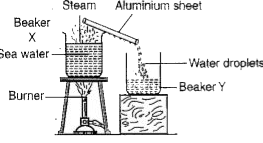Aluminium becomes passive in
Conc.HNO3
H2CrO4
HClO4
Conc. HCl
The correct Answer is:A, B, C
Step by step video, text & image solution for Aluminium becomes passive in by Chemistry experts to help you in doubts & scoring excellent marks in Class 11 exams.
Topper's Solved these Questions
- BOOK - NARAYNACHAPTER - 13TH GROUP ELEMENTSEXERCISE - Match the column8videos
13TH GROUP ELEMENTS
- BOOK - NARAYNACHAPTER - 13TH GROUP ELEMENTSEXERCISE - Integer Type Question37videos
13TH GROUP ELEMENTS
- BOOK - NARAYNACHAPTER - 13TH GROUP ELEMENTSEXERCISE - Level-V (H.W)39videos
13TH GROUP ELEMENTS
- BOOK - NARAYNACHAPTER - 14TH GROUP ELEMENTSEXERCISE - Subjective Questions6videos
14TH GROUP ELEMENTS
Similar Questions
Knowledge Check
- Question 1 - Select One
When dipped in conc. HNO3, metals like iron, chromium, nickel, aluminium, base become passive. This is due to
Areduction of metalsBformation of corresponding nitratesCevolution of nitrogen dioxideDformation of layer of metal oxide on the surface of metal - Question 2 - Select One
Both Be and Al become passive on reaction with conc. nitric acid due to-
AThe non reactive nature of the metalBThe non reactive nature of the acidCThe formation of an inert oxide layer on the surface of the metalsDNone of these - Question 3 - Select One
Assertion (A) : Aluminum is passive towares conc HNO2
Reason (R) : Due to formation of layer of nitrate on aluminiumAIf both (A) and (R) are correct and (R) is correct explanation of (A)BIf both (A) and (R) are correct and (R) is not correct explanation of (A)CIf (A) is correct , but (R) is incorrectDIf (A) is incorrect but (R) is correct .
Amongst the following the metals which become passive when dipped in conc. HNO3 are Sn, Pb, Fe, Cr, Zn, Ni, Hg, Al, Cu.
View SolutionConcentrated nitric acid renders aluminium passive. Give reasons.
View SolutionMetal which become passive with conc. HNO3
View SolutionWhich of the following metals become passive when dropped into conc. HNO3 ?
View SolutionIn the given experiment, some sea water was heated in a beaker. After some time, it was observed that the number of water droplets formed on the aluminium sheet become less and less. Why was this so?

(i) The aluminium sheet had become hotter
(ii) The rate of condensation had decreased
(iii) Beaker X had become hotterView Solution

